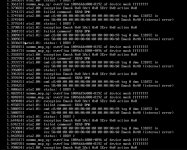Hi,
I've setup a Proxmox cluster on which we are planning to migrate all the VMs from our out of support Xen Servers.
I've been using this script to export and extract the disks directly on proxmox, and for the most part, it works fine.
My issue is that I can only import a single disk from a VM. Any additional disks come without a partition table and the VM does not boot.
I've also tried setting up a FOG server, but I get the same issue, which makes me think it's not a Proxmox issue.
Has anyone had any similar issue moving VMs from Xen to Proxmox?
I've setup a Proxmox cluster on which we are planning to migrate all the VMs from our out of support Xen Servers.
I've been using this script to export and extract the disks directly on proxmox, and for the most part, it works fine.
My issue is that I can only import a single disk from a VM. Any additional disks come without a partition table and the VM does not boot.
I've also tried setting up a FOG server, but I get the same issue, which makes me think it's not a Proxmox issue.
Has anyone had any similar issue moving VMs from Xen to Proxmox?


